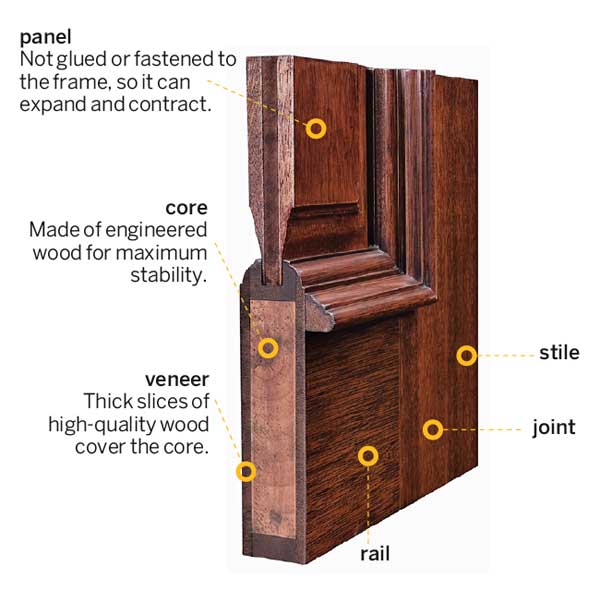All About Wood Doors

An entryway is the focal point of a home’s facade. And the front door, its most prized asset. Dressed with a fine lockset and handsome knocker, the door extends a friendly welcome while also discouraging intruders and shutting out the weather. It’s the first thing we grab when we arrive and the last thing we touch when we leave. So it’s easy to understand why many of us still like our doors to be made of wood. Nothing else matches the material’s warmth and satisfying heft. Or offers so many design options. Steel doors are stamped; fiberglass pops out of a mold. But a wood door can be custom crafted in virtually any shape or size and incorporate whatever molding profiles, panel configurations, glazing options, or carvings that you please.
The knock on wood doors—that they warp—well, that’s largely a thing of the past, when they were made of solid stock. For the past 25 years, most major manufacturers have crafted their entry doors with glued-up engineered-wood cores, which overcome solid wood’s tendency to twist and cup. That handsome outer layer is actually just a thick veneer. Don’t think of this as cheaping out; with regular care, such a door should easily match the life span of your house.
That extra effort—in the form of a fresh coat of paint or polyurethane every couple of years—is the price we pay for choosing wood. But it’s a small one, considering the visual and tactile rewards a wood door gives us every time we come home.
Vitals
Slab vs. prehung?
Prehung doors come hinged to a weather-stripped frame, eliminating the need to square the door in its jamb, and with holes already bored for a lockset. They’re best for new construction (below), when rough framing is exposed. Slab doors, sold without hinges and often with no lockset boring, are generally used to replace existing doors when jamb and trim are in place.
What’s it cost?
A stock slab door at a home center starts at $150, a prehung around $400. Custom prehung doors can run more than three times that, starting at about $1,500.
What’s the warranty?
Defects in materials or construction are covered for two to five years. The factory finish is usually warranteed against failure for two years.
How much care?
Sunlight is the number-one finish killer, causing clear coats to degrade and paint pigments to fade. Sand and recoat varnished doors every year, polyurethaned doors every other year. Painted doors should get fresh coats every five to six years.

